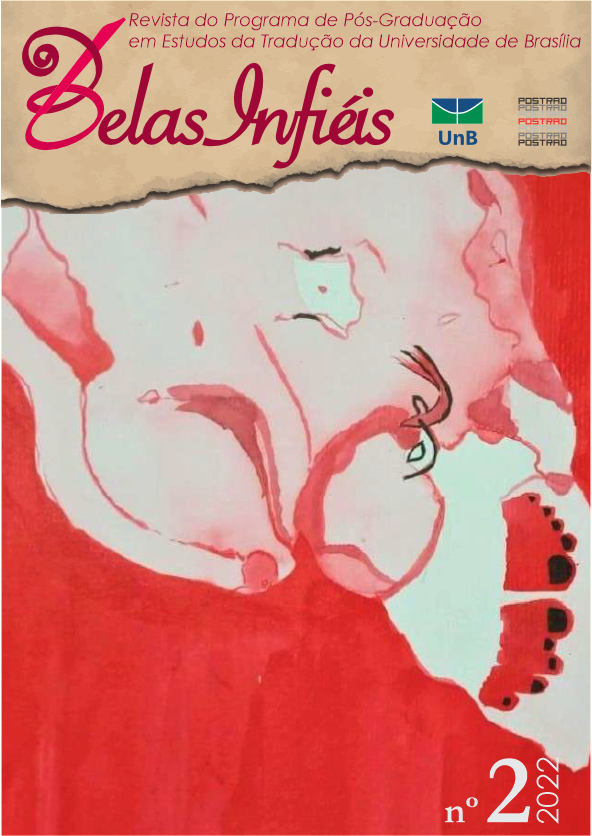(Self-)creating, (self-)rewriting, (self-)translating: literary postures and political postures in contemporary female authors and translators
DOI:
https://doi.org/10.26512/belasinfieis.v11.n2.2022.43016Keywords:
authorial positions – literary discourse – translation – gender.Abstract
The research project Crear(se), reescribir(se), traducir(se): posturas literarias y posturas políticas en autoras y traductoras contemporáneas (2020-2024), supported by the Laboratory of Translation Research (LIT-IdIHCS-UNLP), studies the mutations in contemporary literary practices and discourses based on the concept of posture (Meizoz, 2007, 2011) which reviews and describes the literary act in the light of the constant articulations between the individual and the collective from a sociological perspective. Following this critical and theoretical development, our work proposes an analysis of the emergence of tensions, relationships, and constructions of self-present in the discursive productions of French-speaking authors and contemporary translators who seek to subvert patriarchal language and claim feminist and political ideas. The theoretical approach that we have taken has allowed us to adopt a complex perspective upon the creative act and to discuss traditional conceptions of creative and translating processes given the articulation of concepts from discursive, literary, translational and sociological approaches. We integrate the rhetorical and discursive dimensions that are inscribed in the perspective of the discursive ethos of Maingueneau (2004, 2015) and Amossy (2010, 2012) with the behavioral dimension or corporal hexis, according to Bourdieu (1980 [2017]). The corpus of analysis includes texts written by authors and translators who marked the literature in their languages of writing and translation such as Aurora Venturini, Violette Leduc, Marguerite Duras, Laura Alcoba, Annie Ernaux, Joséphine Bacon, Natasha Kanapé-Fontaine and An Antane Kapesh.
Downloads
References
Amossy, Ruth. (2010). La présentation de soi. Ethos et identité verbale. Paris: PUF.
Amossy, Ruth. (2012). L’argumentation dans le discours. Paris: Armand Colin.
Bourdieu, Pierre. (1980 [2017]). Le sens pratique. Paris: Éditions de Minuit.
Castro Vázquez, Olga (2008). Género y traducción: elementos discursivos para una reescritura feminista. Lectora, 14, 285-301.
Lefevere, André. (1992). Translation/History/Culture: a sourcebook. Londres y Nueva York: Routledge.
Lefevere, André. (1997). Translation, Rewriting and the Manipulation of Literary Fame. Londres y Nueva York : Routledge.
Maingueneau, Dominique. (2004). Le Discours littéraire. Paratopie et scène d’énonciation. Paris: Armand Colin.
Maingueneau, Dominique. (2015). Escritor e imagen de autor. Tropelías. Revista de Teoría de la Literatura y Literatura Comparada, 24 (2015), 17-30. Traducción del francés de Carole Gouaillier.
Meizoz, Jérôme (2007). Postures littéraires. Mises en scène modernes de l'auteur. Ginebra: Éditions Slatkine.
Meizoz, Jérôme. (2011). La Fabrique des singularités. Postures littéraires II. Ginebra: Slatkine Érudition.
Sporturno, María Laura. (2019). La conquista del espacio enunciativo. Un estudio de las notas en la traducción al español de Borderlands/La Frontera. Lengua y Habla (23). Universidad de los Andes, 360-379. Recuperado de: https://www.redalyc.org/journal/5119/511966657019/html/
Suchet, Myriam. (2010). Textes hétérolingues traduits: de «la langue» aux figures de l’énonciation. Pour une littérature comparée diferentielle. Montreal, Quebec, Canadá. Tesis doctoral presentada en el Centre for Interdisciplinary Studies in Society and Culture.
Downloads
Published
How to Cite
Issue
Section
License
Copyright (c) 2022 CC BY

This work is licensed under a Creative Commons Attribution 4.0 International License.
Given the public access to this journal, the texts are free to use but requires the recognition of the original authorship and initial publication in this journal to be properly stated.
 The journal allows the use of works published for non-commercial purposes, including the right to submit the work to publicly accessible databases. Published contributions are the sole and exclusive responsibility of the author(s).Â



















